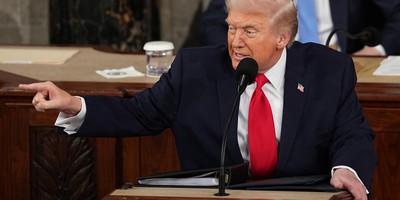Lost in the political shuffle in New Hampshire was an epic U.S. Supreme Court decision this week in Hosanna-Tabor Evangelical Lutheran Church and School v. Equal Employment Opportunity Commission.
By an astounding, unanimous 9-0 margin, the usually ideologically divided Supreme Court slapped down President Obama's radical doctrine that the federal government can tell a church who it must employ as a minister if the church violates anti-discrimination employment provisions.
The Obama administration's claim that there is no special protection for clergy in our Constitution, the majority ruled, "is hard to square with the text of the First Amendment itself, which gives special solicitude to the rights of religious organizations. We cannot accept the remarkable view that the Religion Clauses have nothing to say about a religious organization's freedom to select its own ministers."
Professor Douglas Laycock argued the case for the Becket Fund for Religious Liberty, which defended the little Michigan church in court. Laycock is a longtime advisory board member of the organization (becketfund.org), which defends the religious liberty of all religions.
"This is a huge win for religious liberty," he said via a press release. "The Court has unanimously confirmed the right of churches to select their own ministers and religious leaders."
Kevin Seamus Hasson, who recently stepped down as the head of the Becket Fund, noted:
"This case is important on several levels, not the least of which is that unanimous opinion is an utter repudiation of the Obama administration's radical approach to this case. The Justice department actually stood up in the Supreme Court and said the First Amendment is essentially irrelevant to a church's ability to hire and fire its own ministers. They wanted to make it just another freedom of association case, as if whom to employ to teach a churches doctrine is no more remarkable than the decision of a local plumbers union on who should represent it on a weekly bowling tournament."
Recommended
The Roberts majority opinions affirmed a "ministerial exception" exists, rejected the Obama administration's radical views, but left for a future day the question of how courts should determine who counts as a minister for the purpose of the constitutional protection.
Probably the strongest opinion for religious liberty was offered by Justice Clarence Thomas, whose concurrence said churches have unfettered freedom to decide in good faith who is a minister, and courts may not second-guess that decision.
But it's notable that Obama's former solicitor general, Justice Elena Kagan, joined a separate opinion by Justice Samuel Alito that signaled an even stronger refutation than the majority of the Obama administration's radical rejection of special protections for clergy from employment discrimination laws. Kagan and Alito called for an objective standard, not a subjective one -- not so much on who is labeled a minister, but what functions the employee performs: Do you lead prayers, other religious rituals and teach the faith? If so, the government cannot tell a church who it must hire or cannot fire.
Also notable is the fact that the majority opinion roots its rejection of Obama's view in both the Establishment and Free Exercise language of the First Amendment: "Congress shall make no law respecting an establishment of religion, or prohibiting the free exercise thereof."
To pick and choose who can be a minister, the court ruled, is not only to prevent the free exercise of religion, it inevitably involves the government in the establishment of religion.
Thanks to the amazing high-powered and principled lawyering from the Becket Fund, the Obama administration's capacity to restrict religious liberty just took a big hit.
Thank God.

























Join the conversation as a VIP Member